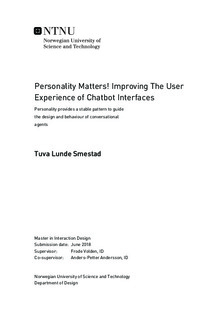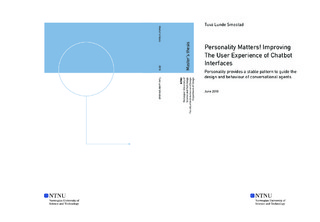| dc.description.abstract | Recent advances in machine learning has contributed to the rebirth of the chatbot. Lately we have seen a rise in chatbot technology being made available on the web and on our mobile devices, and recent reports states that 57 % of companies have implemented or are planning to implement a chatbot in the near future. Chatbots are therefore a big part of an AI powered future, however recent reviews find chatbots to be perceived as unintelligent and non-conversational. Such findings have not slowed down the rapid implementation of chatbots online, and the same mistakes seems to be repeated over and over again. Chatbot services have been found to save companies an estimate of $ 8 billion by 2022, and extends to customer service tasks, product purchasing, shopping assistants, recommender systems, service or product support. This explains why so many are eager to implement their own chatbots, but the reviews make one wonder whether we now are forcing users to adopt technology which they find frustrating and useless. Chatbots are becoming an extension of the services companies provide, therefore ensuring a great user experience is important not only for a company's brand image, but also for the users of their services. Existing literature regarding how humans perceive conversational agents have found that personality can offer a stable pattern to how the chatbot is perceived, and add consistency to the user experience. This master thesis project investigated how we could improve the user experience of chatbots through personality. The thesis is twofold, the first part of the thesis consists of a detailed description of the personality framework developed and implemented to build a chatbot prototype. The framework combines techniques from user-centred design, branding, and personality theory, to build user-centred chatbots through a design process with a basis in personality. The thesis also offers a method to test and evaluate the modelled personality in regards to whether it is perceived as intended by the designer. The second part of the thesis consists of an experiment to investigate whether personality has an improved effect on the user experience of chatbot interfaces. The experiment found that the chatbot personality built using the personality framework had a significant improved effect on the user experience. | |

